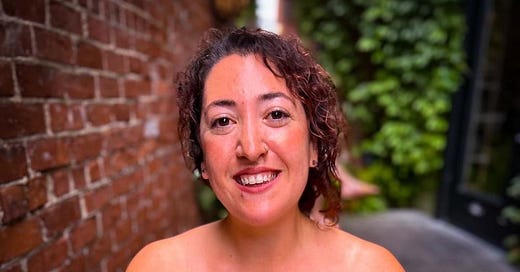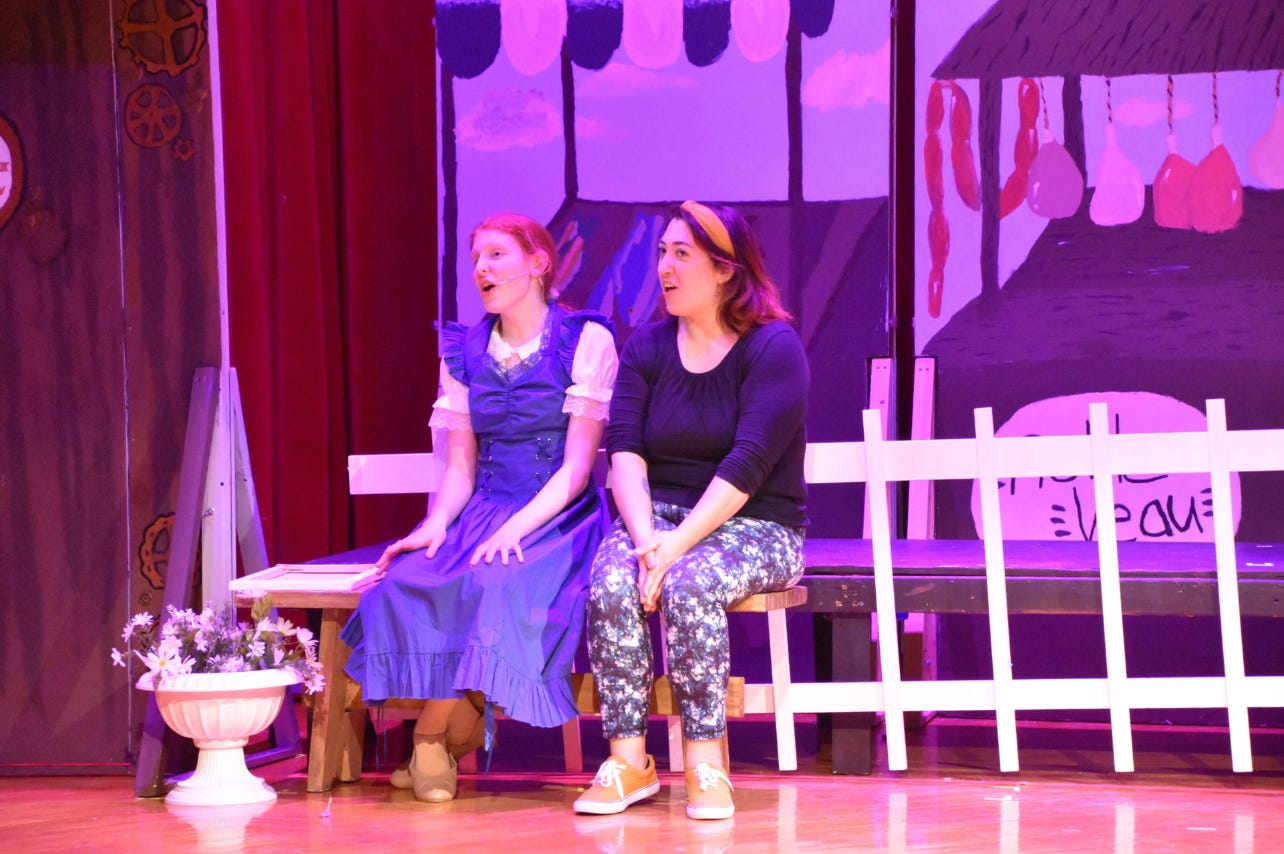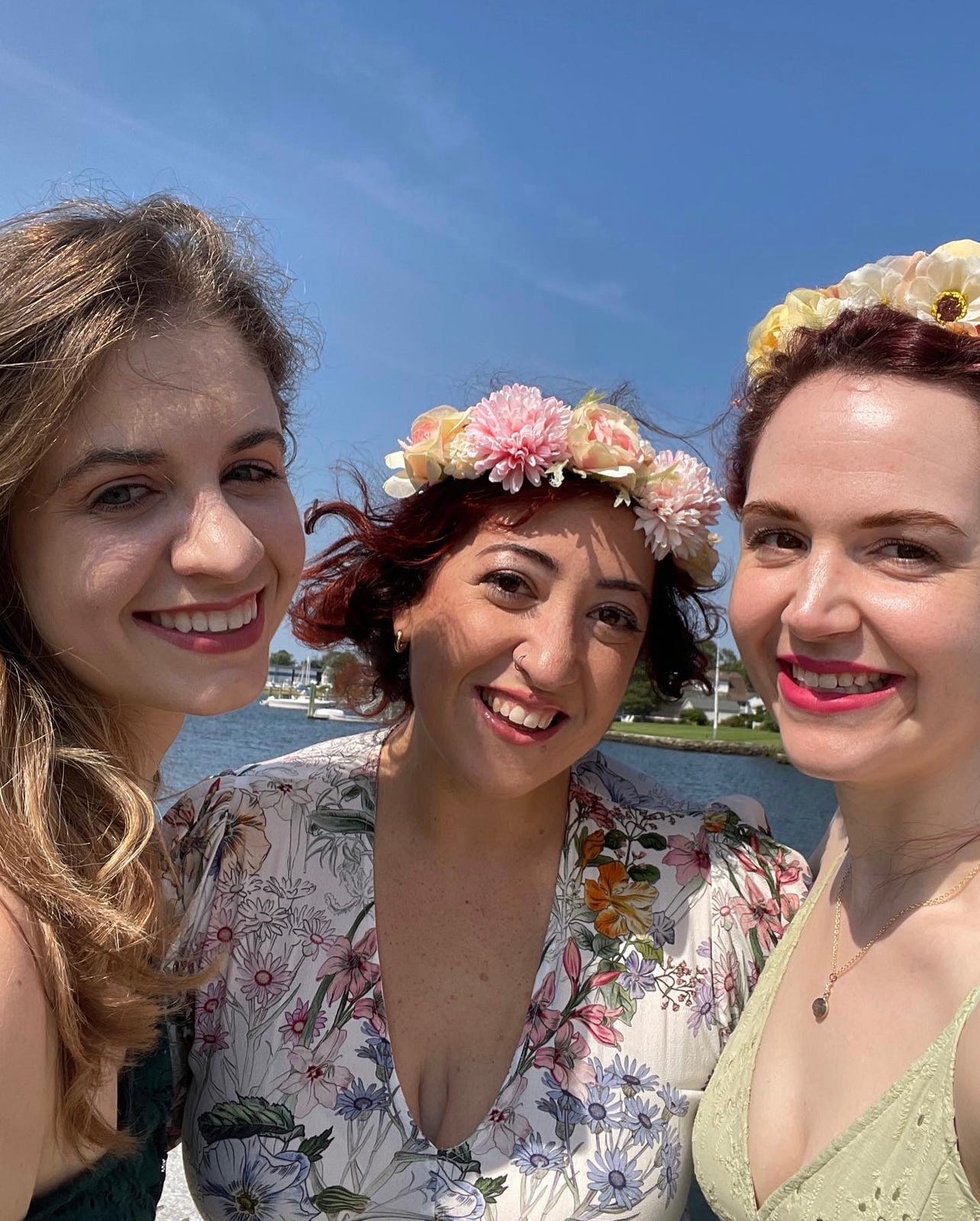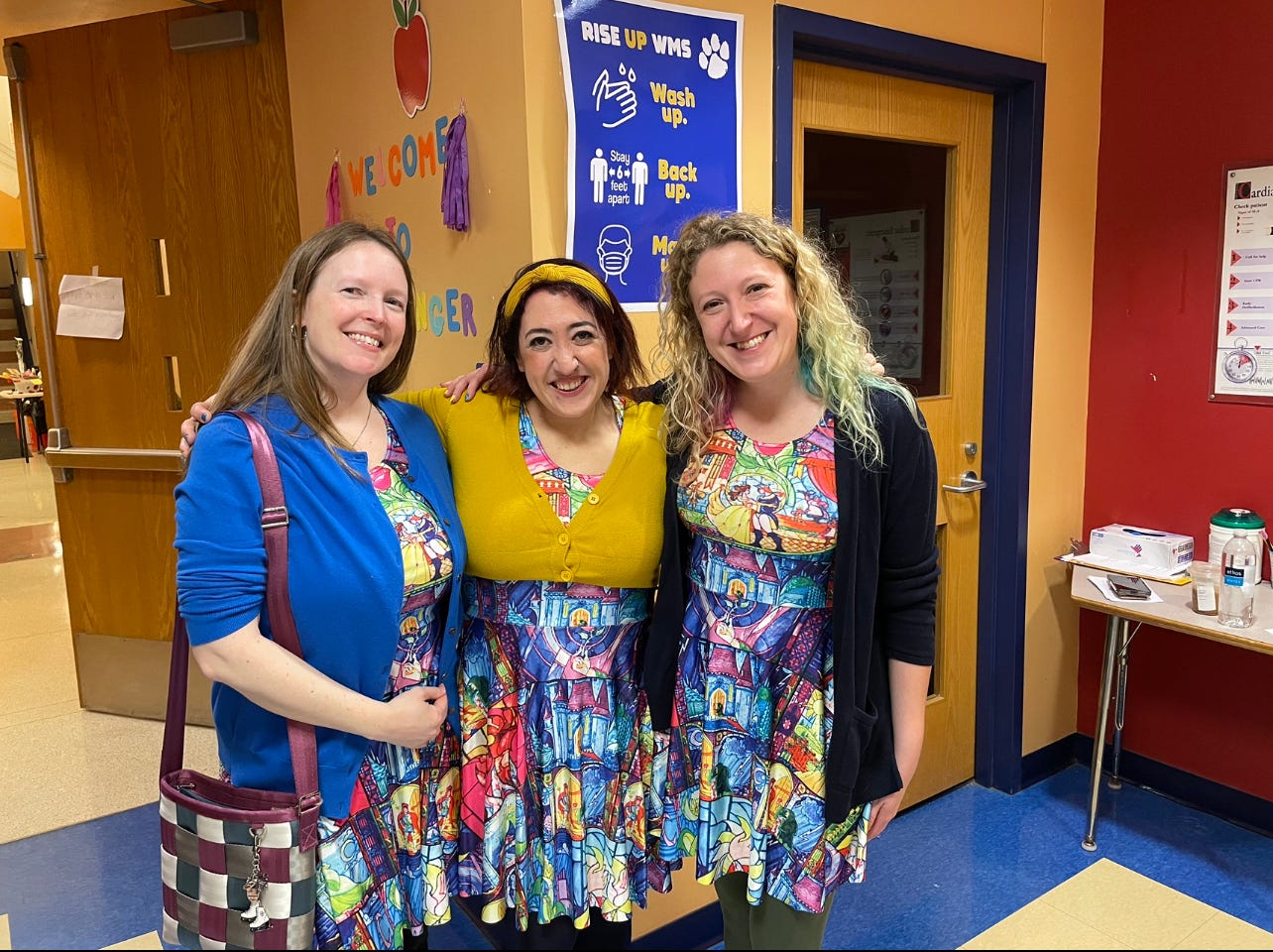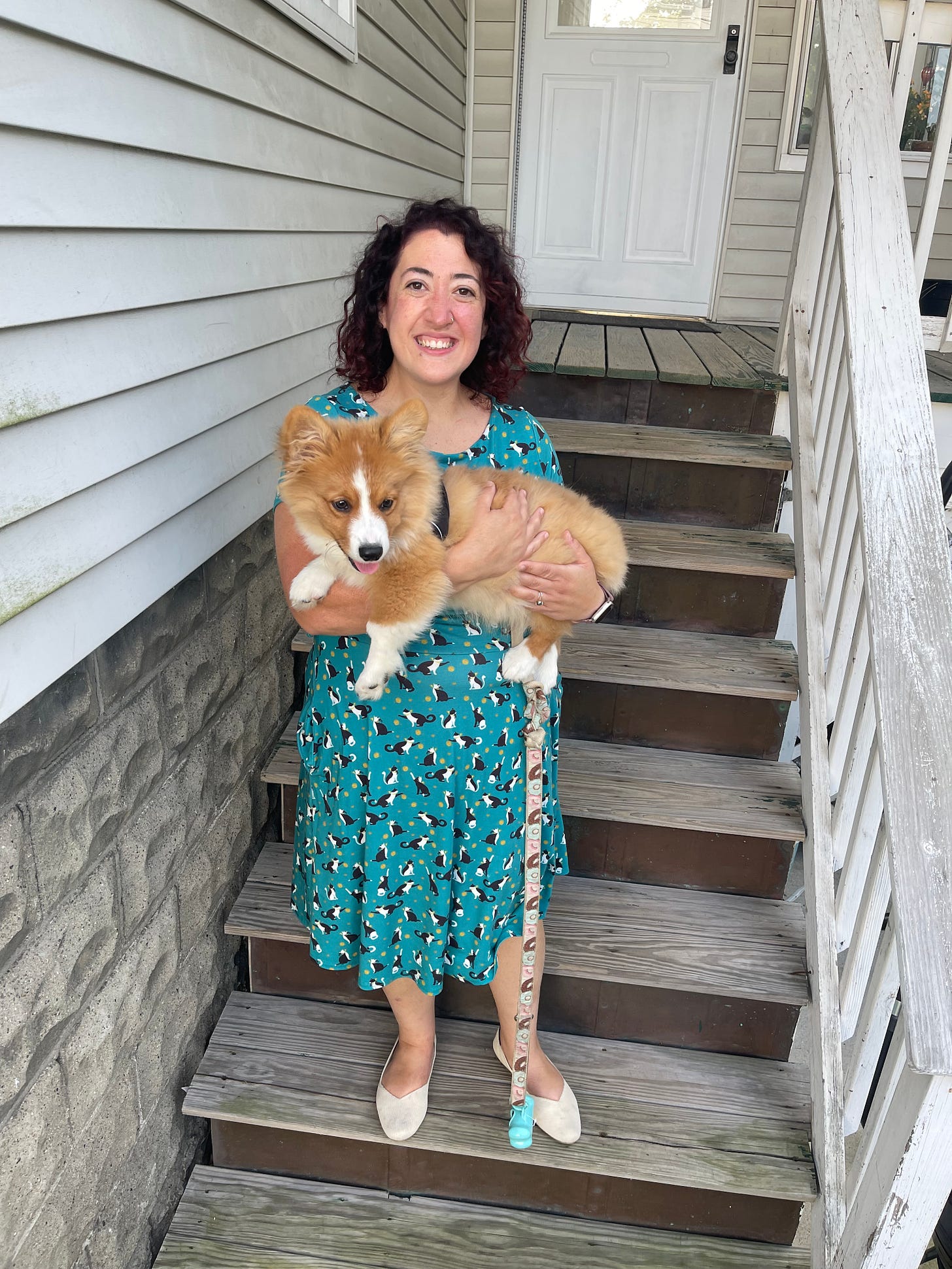Welcome to our first Artist Interview! As I mentioned last week, I’m interviewing working artists about their careers. I’m excited to share this with you. While I’ve known I wanted to be a writer since I was 9, I had no clear path how to make that happen. I’m hoping that these interviews will be a helpful resource to anyone who wants to make a career in the arts.
Note: Today is your last day to sign up for my workshop with Write or Die! Class begins tomorrow and you can sign up here.
Our first interviewee is my dear friend Samantha Prindiville. Sam lives in Arlington, MA with her husband, Matt, and a few cute critters. We met back in 2021, and became fast friends - because every Virgo needs another Virgo in their lives to cheer them on and overanalyze things together. Sam is a music director and singer, and ahead, we talk about her passion for music, how she decided she wanted to be a music teacher, and what she does in her downtime (hint: it involves her cute animals.)
Note: this interview has been condensed and edited for clarity.
Thanks for chatting with me Sam! Let's get into it. What's your job?
My full time 9-5 is I'm a 6th and 8th grade chorus teacher. I also teach 6th through 8th grade general music classes. Then, after that, I run the middle school’s Acapella program, and the middle school and the high school drama program.
I freelance as an accompanist for auditions or for rehearsals. I freelance as a music director for shows for musicals. I also freelance as an organist, or section leader for different churches.
To clarify, are the Acapella and theater part of your official music teacher duties?
They’re stipend positions, so I have to reapply every year. But they’re not in my teaching contract. They're just extra. The chorus and the general music classes I teach during the day are the contractual parts. It's kind of interesting, because the more I've been in charge of the theater and the more I've been doing the Acapella, I realized how much it actually feeds my passion.
How did you get into music? Where did that all start?
I've been surrounded by music all my life. My grandmother was a piano teacher. My mom was a piano teacher. Typically, when you learn an instrument, you want to start as early in life as possible, primarily starting with the piano. I started taking piano lessons when I was four years old, I think. And initially, my mom was the one to try to teach me. And she brought me over to my grandmother's house and was like, “Here, you take her, I can't teach her,” because I guess I was just very argumentative. I just knew everything better.
So my grandmother was the one who had the patience enough to teach me. My mom was the choir director for the church that we attended, so I was in the children's choir. I loved music class, I participated in the third-grade play, I did school talent shows. I learned how to play the clarinet in 4th or 5th grade and did jazz band.
But I will say that, for as much music as I did, I don't remember being told, this is your gift, you know, this is what you are really good at. I knew I was a decent musician. I could read music, play piano, but it was never, you have something to share with the world. So when I thought about what I want to do as a career when I’m older, I thought about it and thought maybe I'll be an English teacher. I loved reading, and I liked writing a lot. And I have younger siblings and I was just naturally good with kids. I think I wanted to teach English because I liked my English teacher.
But, we moved and that completely changed my trajectory. We moved to New Hampshire from New Jersey when I was in eighth grade. I did all the typical things: I signed up for soccer, I signed up for band, I signed up for chorus, the typical things I had always done. There were auditions for chorus for the song Somewhere Over the Rainbow, and it was a pretty big solo. I auditioned for it, not really thinking anything of it, because why would I? The music teacher clearly knows the other kids better. I didn’t think I had a chance.
I remember exactly where I was sitting. I was sitting in the front. And Mr. Bush, the music teacher, says, “Oh, it's time to announce who got the solo.” And he announced my name. Everybody turned to look at me because they're like, who is this check? In that town, everybody knew each other. And here I come, this brand-new kid, and I get the coveted solo. And I remember my heart bursting. And it was literally in that exact moment that I was like, if my music teacher can make me feel this good about myself, I want to do the same for others. And I kind of decided right then and there: I want to be a music teacher.
I then threw myself into literally anything and everything music related. I did band, chorus, jazz band, select chorus. I got into All State Chorus and All New England Chorus two years in a row, I participated in drama club all four years, got a lead my junior year was the Drama Club President my junior and senior year of high school, and received a special award in the performing arts my junior and senior year as well. My performing arts teachers and advisors in late middle school through high school were significant in my decision to go into teaching.
How did you end up deciding to teach middle schoolers?
My trajectory initially was to become a high school chorus teacher - that's what I really wanted to do. But as you know, the universe works the way it works. Almost my whole entire teaching career, except for my first year when I student taught and long-term subbed, I've always taught (either instrumental, general or vocal) middle school. And there's something about middle school and the fact that I found my sense of self in music in middle school. I know what it means to not find your place. I want to be the kind of teacher and have the kind of classroom environment where when the kids come to class, they feel at ease. And I think middle school gets a bad reputation. Because people remember their experience in middle school as being less than pleasant, so it’s understandable. You know, I really don't have some of those issues that everybody thinks there are when it comes to teaching this age group. They're still trying to figure themselves out. So I grant them a little more grace, and remind them that we are all human and have our good and bad days, which makes them feel better.
It sounds like Mr. Bush and your drama teacher were really big influences on you. Did they help you professionally? Or was it more, Oh, I see someone who's doing this and I know I can do this too?
More than anything, they gave me the confidence. I was never really encouraged or told this is your thing, You are so good at this. And the way that Mr. Bush and Mrs. Holly did this for me, they didn't say it in so many words. I knew Mr. Bush saw something in me that I didn't think I had in myself. I never got solos, I never got big parts in the shows when I was living back in New Jersey. And so music was something that I loved but I just didn't think anything of it. So the fact that he gave this new kid a solo…that's kind of what did it for me. Mrs. Jordan was my chorus teacher in high school who was also a major part of why chorus was the trajectory I chose. And Mrs. Holly, she gave me my first lead in a musical. It was West Side Story. We did our musicals from January through late March, and after I auditioned for them, we did the callbacks and everything like that. My mom was the music director at the time, and she later told me that when everyone had auditioned, Mrs. Holly was like, “Okay, well Sam is Maria. So let's figure out the rest of the cast.” I was like, Oh, wow!
I think I drove my family crazy because I really couldn't stop talking about Natalie Wood. I was watching biopics, reading all the books about her. So I got cast in December before the winter break. When I came back in January, I literally had memorized all my lines. I was like, Okay, let's go. I'm ready. I'm here. The next year, we did Footloose. I really wanted the role of Rusty, but I got the role of Ren’s's mom. And she had like a solo here and there, and had like, maybe a handful of lines. And I remember my best friend in high school, she got Rusty. I'm not gonna say I wasn't disappointed. But my best friend, she was Rusty. She just was. My friend wanted help with singing, so I would work with her every day after rehearsal. Or when she didn't have to be on stage, or I didn't have to be on stage, I would give voice lessons in the back and we would practice the songs. At the end of the year, I got the - it's not sportsmanship in theater, but it's like, most supportive. I got that award.
Most importantly, it was like the other kids who voted for it. It wasn't like Mrs. Holly picked it out. It was an important reminder that maybe the person who you think is going to be the best fit for a part won’t be. Having that as a realization has also been very helpful in how I cast my shows. When I did School of Rock, the kid who played the lead, she worked so freaking hard on her voice. She was studying hard and she could act circles around the other kids. Her voice, while very good, wasn’t as strong as some others who auditioned but I was like, You know what? I can't see anybody else playing this part. When people came to see the show, I have never gotten so many compliments on how I (along with the creative team) cast the show. I got a lot of, “That was the most perfectly cast show I've ever seen.” So I took a page out of Mrs. Holly's book. I cast who was right from the heart, even if they were missing this one element.
It sounds like you had an idea going into college that this is what you wanted to do, that you wanted to be a music teacher. What did you study in college? I don't know what the correct word is, but is there any certification you needed to get to be able to teach music?
Initially, I really wanted to study musical theater and music education. I got accepted into one college for both. But then the school I ended up going to, I got accepted into the music education program, but I didn't get into the musical theater programs. In retrospect, it would have also been very hard to do both. So I studied music education, and in music education, it's like a double major - because you'd have to take all the music courses, and you take all the education courses. Not only the education courses about music, but also the education courses about education. So every single semester, I took anywhere between 10 to 12 classes.
When I was in 8th grade, I knew I wanted to be a music teacher. But I also had to pick which instrument I wanted to study. I could have picked voice, piano or clarinet. I was a good clarinet player, by no means amazing, but I really loved playing clarinet. When it came time to it, I looked at the requirements for each instrument, and I was like, I don't want to memorize this Sonata for piano, I looked at the clarinet and went Oh, I really don't feel like learning this piece next. With voice, it was Oh, well, I already know a song in a world language and I can find a folk song. So voice it was! And again, having a very supportive chorus teacher in high school was also key.
I also took a bunch of vocal performance and pedagogy classes as well, to get myself well-versed in that regard. Because I had a pretty good sense of choral stuff, I thought, let me study instrumental techniques. I chose that because I knew that would make me more marketable. Because at this point, I just want a job! In that class, you have to learn all the instruments, like all the typical band and orchestra instruments, you have to learn them as a music education major, and then you also have to kind of prove that you should still be in the major at the end of every semester, by doing your juries. I took lessons every week from the private voice teacher, and I had to perform for professors. If you pass great, if not, they may reconsider you for the program. I know a number of people who were put on a probationary period or sometimes were told, I don't think is the right fit for you. Not because they weren't good, but maybe they weren’t ready for certain aspects of the program.
While I enjoyed it, I felt very much like an odd duck. I didn't feel like I really fit in much of anywhere. I was very energetic. And some of that is due to the fact that I had undiagnosed ADHD and had no coping strategies to deal with that. But I didn't feel like I was getting the feedback of, “You are going to make a really great teacher” from my professors, except for maybe one or two. I never got that kind of encouragement from them. So it felt very lonely. And music school is very competitive! As much as we're supportive of each other. We also have that imposter syndrome, where we have to prove that we deserve to be here too.
In addition to music, I was also very community service-oriented. It wasn't because I needed a pat on the back, but I was very much into social justice. I helped run the Hunger and Homeless Awareness Week. I did the community service orientation my freshman year, before school started. I was involved with alternative spring break. I also coordinated a thing called Empty Bowls. And I was also a Diversity Fellow. Which I know seems odd, but it's the middle of New Hampshire where there wasn't a ton of diversity, and I’m Jewish, so that was diverse for them.
I knew this would look good on my resume, but it's also stuff like I wanted to do anyway with my time. Looking back on it, I was also just feeling I need to keep myself busy. So I didn’t have time to dwell on my feelings or my emotions. So that was also a huge component.
Was there anyone in college who influenced you like Mr. Bush or Mrs. Holly in high school?
Asides from Mrs. Jordan, who was just a wonderful chorus teacher, I've only ever had voice lessons in college. I never took private voice lessons growing up. And my first voice teacher, I loved him. He was brand new to the college. He was just so kind, so nurturing and helped me out so much. We couldn't figure out what my voice type was. And that was frustrating - especially when you're seeing it in a music program, where people are always like, Well, I'm a soprano, I'm this, I'm that. When he left, it broke my heart.
Then I had somebody the following semester who was nice, but he was only there for a semester. And then my senior year I had another voice teacher, and she was very nice, really helpful.
But there was a class, I took, Vocal Pedagogy, with the head of the voice department who was a beautiful singer and an excellent professor. I didn't always necessarily agree with her, but she was very, very good at what she did. For the final in that class, you could either write a paper, or you could teach private lessons to somebody and she would grade you. I chose to teach private lessons.
I taught a friend's voice lessons for a month. And then I had my final exam. I’ll never forget this – after the voice lesson, the professor looked a me, and she said, “You're going to make a very good voice teacher. That was a very good lesson.” And, she gave me feedback to work on, but she said I'll make a good teacher. And that's always stuck with me.
You can answer this next question however you want. Do you consider yourself a working artist? Or just an artist? Or do you consider yourself more of a teacher instead?
That's a good question. I would say in the first part of my career, I was definitely a working artist, because I had part time jobs that I cobbled together. I had part-time teaching jobs, and then I would get gigs. I would definitely have considered myself a working artist. Now, I'm also trying to distance myself a bit. As I said, I've known I wanted to be a teacher and an artist since I was like 13 years old, and that's great! But I’m also a person outside of my job.
The issue with artists is that we get so wrapped up in being an artist, that if things don't align the way that we want them to, we start to doubt ourselves as an artist and ourselves as a person. I used to only consider myself a teacher and an artist, but I’m all these other things, too. That way, if something goes wrong with my teaching, or with my artistry, that way I don't have to feel like I'm not good enough.
If I wasn't doing the things I'm doing now, or if one of those gigs went away, I’d be fine. I used to be a music director for churches for like, 10 to 12 years. I used to identify as, I'm a music director for churches. But then I decided to leave that to pursue more theater.
I will say that I’m lucky that I have a job that feeds me. For Matt, my husband, his job right now 9-5 is working in health care, which doesn't feed him. I consider myself really lucky that I get to do the thing that feeds me as a human and something that pays my bills. I’m very lucky to have married somebody who was willing to do whatever it took so that I could have the kind of life for myself that I want. So allow me to thank him here.
Aside from your college degree, do you have any post-graduate degrees?
I do have a Master’s. You have to in Massachusetts. You have to have a Master’s degree in your field of teaching or something related. I have my Master’s of Music in Music Education from SUNY Buffalo State University. it was all done online, because I didn't want to give up teaching to study my Master’s. Now I'm working on getting my Master's plus 15, which means like, you get 15 credits additional. And you get paid more.
What do you like most and least about your job?
Which one?
You can answer however you’d like.
I'll say the things I don't like, first. There isn't that much that I dislike. What I wish would happen is a more universal thing. I wish sometimes that the powers that be would understand my program a little bit better. Like, they think, Oh, you teach chorus. Oh, you teach music and bla bla bla, They don't actually understand the complexity of what we do. Sometimes that creates a little bit of a hurdle. For the full school year? I have 330 kids. I teach 1/3 of the school in my programs.
If the admins just put in a bunch of random kids in my class who didn't want to be in chorus, well, you're adding to my caseload, and you're also putting kids who don't want to sing into chorus. So that's the tough part, I think. And honestly, it's small potatoes.
My favorite thing is that my class is the class that kids come to and you just see them relax their shoulders. You see a smile on their face. You can see the burdens of their other classes leave as soon as they come in. I will also never forget this. I had a student last year. At the beginning of class, she was like, “I'm having a really bad anxiety attack, can I please go to the counselor?” And I said, “Yeah, sure. Let me call her.” And so I called, and the counselor was like, “I can't talk to her right now. Can I come grab her at the end of the period? Or she can come to see me at the like, end of the period?” And I said, “Okay, sure.” So I told this student, “Listen, I'm so sorry. I know what it's like to have anxiety. If you just want to listen today, totally fine. Just follow along in your music or do what you need to do to feel better.”
So we go through class. And at the end of class, I said, “Oh, you can go see the counselor now.” And this student said, “Oh, I don't need that anymore. I feel better now.” I still checked in with the counselor, and she confirmed that after my class, she felt less anxious.
With gigs, my answer is slightly different. The thing I least like about gigging is that it's unpredictable. Sometimes you'll want a gig that conflicts with another one, and you have to turn one down. There’s also that thought in the back of your head, well, if I keep turning down gigs with this particular person, they're gonna eventually stop asking. That's the thing I like least about it. It really hasn't happened for me yet, but it's always in the back of my mind. The thing I like best about it is like making new friends making new connections and getting to learn from other people who are more experienced than you. And knowing that we're all here for the common purpose. We love music, and we love theater.
Do you have any artistic practices outside of your jobs? Do you have anything outside of singing or music that fills your creativity?
I don't know if reading books on different methodology counts, but I do skim through books on different strategies on teaching kids to sing. I like to also workout because it makes me happy. . I find that I have much better stamina to teach when I workout. Sometimes, if I need a break from something, I like playing with my cats and dog. They're just amazing. They are also ridiculous.1
You kind of answered this already, but is there anything else you do to continue developing your own, skills? What's your continuing education?
There have been points in time where I took voice lessons from some very good voice teachers. That was really helpful in working on my own voice, but also what I took from that I apply to when I teach my students. So I think that's been really helpful. It's more of a financial decision as to why I didn't continue. I've gone to different conferences, which I’d like to do more of. Next summer, I’m thinking about doing the Broadway Teachers workshop. It's in New York City, and you get to work with some of the professionals and learn different techniques. I love theater, but I didn't study the different ‘ologies.’ I'm learning as I'm going. I also am very active on the high school theater teachers page and MS theater director’s Facebook pages. So I get a lot of my helpful information from there.
That kind of feeds into another question I have in terms what were the most helpful resources for you?
You know, I really don't know.
Asking the hard-hitting questions, here.
You are. When I was telling my mom about what I wanted to do, she was like, “Well, you should get the music education degree because you need money. You can't just get a musical theater degree.” And in hindsight, she was right.
Unfortunately, money plays a factor into everything, you know. I was a solid B student. I think I graduated in the middle of my class, I think I was 49 or 50 out of 99 kids. I did all the activities I could, I excelled at music, but I didn't really have anybody who said, “You should consider this school. You should consider doing this. You should consider doing that.” I talked to my mom recently and asked her, “Mom, why didn’t you just put me in music camps? Instead of soccer camps?” And she said, “Well, you didn't seem interested.” In music camps?! I'm fairly sure I would have been over the moon to go to music camp instead of playing soccer for six hours in the sun.
Again the not knowing if I'm good enough and not having that encouragement, to be like, yes, you should absolutely study this, you are gifted. I can't really say I had anybody to guide me. My first voice teacher in college was really my biggest champion and supporter. He was really influential to me.
Going back to best and worst, what do you like most and least about being a working artist? Or as, someone who uses their artistic abilities to earn money?
I think the worst part is when other professionals are dismissive of my experience. I've worked with some really great theater companies. I've also worked with some unique theater companies. I've worked at some really great churches. Nothing's been super prestigious, which is okay. I sometimes feel like I'm not taken as seriously: A) because my skill level might not be on par with some of the other big names out there, B) I don't have the time to be a professional musician, and C) I haven't worked at the big theaters. A little bit of it might be because I’m a woman. It's primarily a very male-dominated industry for music directors. I can't think of any, off the top of my head, female music directors who are working at some of the semi-professional or professional theaters in Boston.
I think the best thing about being a working artist is that you never know what new thing is going to reignite your passion. There have been some theater gigs where I'm like, “Man, I just need the money.” I don't really like this. But then there are other gigs where I'm like, “Yeah, this was really cool. This was awesome. This is why I love theater, or this is why I love playing the piano.” I will say I've had way more positive experiences than negative experiences. The negative experiences just make for a funny, story in the end.
What is what is next for you?
Besides my regular teaching, I'm back to directing at the middle and high school. With an absolutely amazing production dream team by my side, I am directing a fall play with my high schoolers, a winter musical with my middle schoolers, and then a winter/spring musical with my high schoolers that I give some of the middle school students an opportunity to participate in. Outside of school, I am going to be one of the music directors for an improv troupe out of Boston called Catalyst Comedy that performs a show called Dirty Disney. We perform at Laugh Boston, two or three Fridays a month depending on the schedule. I'm in rehearsals for that, and then my debut with them is on Friday October 13th at 10 PM.
I’m the associate conductor of the Firebird Vox, a choral group that is branched out from the Firebird Pops Orchestra, and we had a one-night-only performance of The Hunchback of Notre Dame which was amazing, and we will have some December concerts.
I’ll be working as a music director for Arlington Friends of the Drama, We are putting on Twelfth Night and the director is a dear friend who I worked with on a show I music directed in 2022 called 25th Annual Putnam County Spelling Bee up in Newburyport.We also call each other a dream team, because we work very well together, so I'm excited to work with them again.
Where can people find you?
Samantha CP on Facebook
Wilmington Public Schools Theater Program on Facebook
@samalamabobama is my personal Instagram account
@samanthaandherhealthjourney is my mental-physical health/fitness Instagram account
The last question I have is there anything else that you wanted to add? Either about your trajectory up to this point?
I think that right now I'm feeling very content with where I'm at, which hasn't always happened. For a very long time, I was always thinking of the next big project, I was always thinking of the next big thing I wanted to do. And right now, I'm just enjoying the ride. And I don’t think you asked for this, but I think if I were to give a piece of advice to anybody who's considering being a working artist, it would be to just go for things, figure it out if it works in your schedule or not, because you don't know what these smaller gigs are going to lead up to. At the very beginning of my teaching career, I was really a very part-time teacher. And so I had to take gigs to supplement my income. Well, one of those gigs was working as an accompanist at the school district that I am now full-time employed at, where I get to do all the things that I've been wanting to do since I was 13. But also, don’t be afraid to be discerning if something doesn't feel right. You don't have to do that gig, as well. Don't be afraid to go after things, but also, you should listen to your gut instinct and decide whether or not it’s right for you. You don't have to take everything that comes your way, even if you really want to, because self-preservation is really important. Otherwise, you're going to burn out and you won’t find the joy in your art. There were a couple of times where I was definitely burned out. So I took a break, and it was good. And then I was like, Oh, right. I need this in my life again, and I got back to it. So you can always go back to you art.
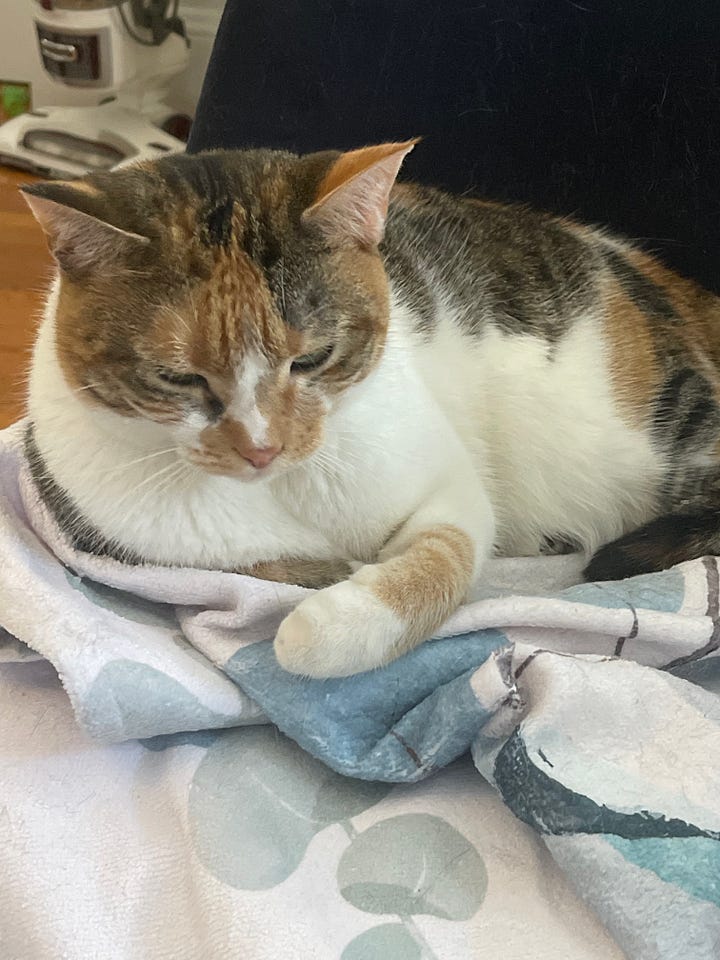
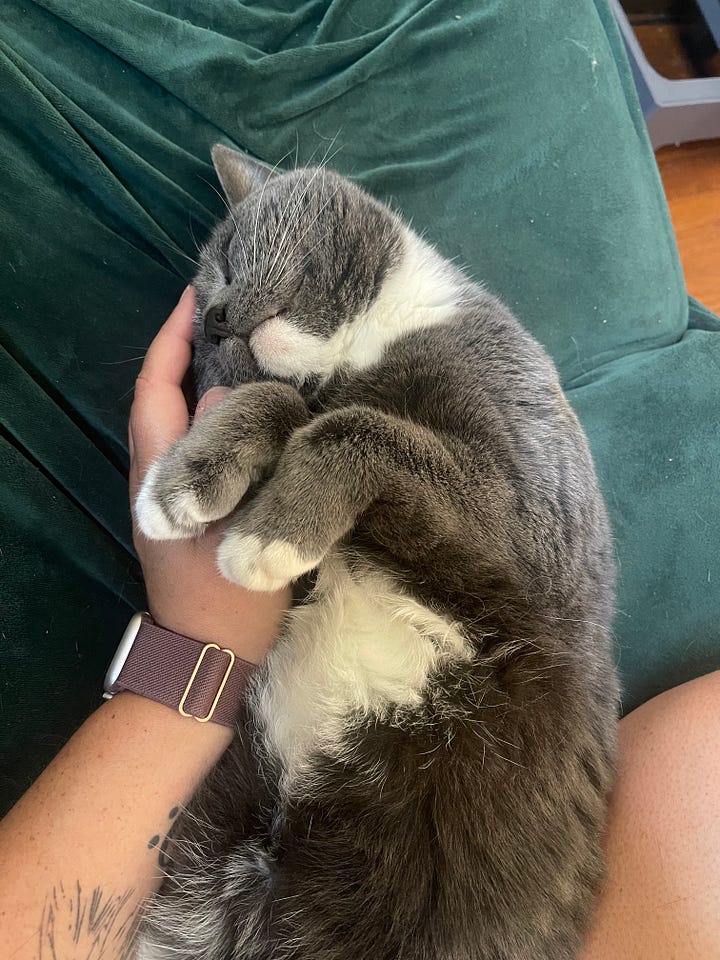
That’s very wise. One of the things that I envisioned with this Substack was if someone was reading this, and if they were looking for a full-time or part-time career pivot, and asking themselves How would I do this? What are the practical things that I can do? Because sadly I think many arts careers look very opaque from the outside.
Well, that's also a good question, which actually, I don't think I answered. I was able to make different connections through my college. And then when I first started applying for teaching jobs, I would look on different websites for other gigs as well. Through the smaller gigs, I ended up getting bigger ones later on. Because I had already established myself. Smaller things led to bigger gigs, bigger jobs. I scoured different theater, job websites and pages and things like that. And then it was word of mouth. Sometimes I'll get emails from people I've haven't talked to ever about different gigs. So word of mouth is really helpful.
Thank you so much for talking with me Sam! I really enjoyed our conversation.
This was fun! I never get to talk about this stuff.
Having sat Sam’s kitties before, I can confirm this is true.

